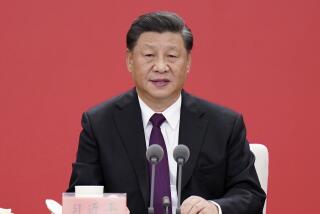U.S. Seeks Strategy of ‘Open Skies’ With Some Asian Nations
- Share via
TOKYO — Pushing for more convenient and less expensive trans-Pacific air services, the United States is seeking “open skies” agreements with several Asian nations and will bypass a reluctant Japan if necessary, a U.S. official said here Thursday.
Preliminary talks on such pacts--which open air services to unrestricted route and pricing competition--have been held with South Korea, Taiwan, Singapore, Malaysia and New Zealand, said U.S. Assistant Secretary of State Alan P. Larson.
Larson is here to resume long-stalemated aviation talks today with Japan, and he stressed that Washington also wants Tokyo to agree to the concept of “open skies”--at least as a long-term goal--as part of any settlement to the current U.S.-Japan aviation dispute.
The concurrent talks with other countries amounts to a new U.S. strategy on the aviation dispute, which is the most contentious U.S.-Japan trade issue. In previous talks, which broke down in August, Japan opposed open skies.
Speaking at the Japan National Press Club, Larson pointedly noted that if other Asian nations agree to liberalized aviation pacts and Tokyo refuses, Japan could see its position as a regional transportation hub eroded. He said this is not a negotiating threat, just an economic fact.
The new strategy for the Pacific Rim is perceived here as one of the most dramatic examples yet of a trend toward “Japan passing” as compared with “Japan bashing.” The catch-phrase refers to decisions by government or business to place priority on strengthening ties with other Asian partners when frustrated by hard-to-crack Japanese markets.
Although the two approaches are often seen as alternatives, they are not necessarily exclusive. The more progress Washington can make in liberalizing aviation agreements with other Pacific Rim nations, the more pressure is felt by Tokyo to agree to similar steps.
“Our discussions with governments along the Pacific Rim indicate that there are several countries . . . that see open skies as being very much in their interests, particularly in a globalized world economy,” Larson said. “We expect to initiate negotiations with some Pacific Rim economies and countries this very month, and we don’t expect that those negotiations will be very difficult or time-consuming.
“We believe that it is in Japan’s own interests to be part of this movement, and not to be lagging behind. Among other things, it will ensure a continued central role for Japan in Asia’s air transportation network.”
The U.S.-Japan aviation negotiations bogged down last summer with the two sides threatening sanctions against each other. They eventually backed off from a confrontation but stopped talking.
Tokyo is demanding revision of a 1952 agreement, reached during the post-World War II U.S. occupation of Japan, that it says is unfair.
Washington has said it is willing to revise the agreement in ways that open competition, but that Japan must first fully live up to all existing terms.
The specific bone of contention is Japan’s refusal to approve new cargo routes for Federal Express. Japan says Federal Express has violated the agreement by carrying more cargo between Japan and its neighbors than between Japan and the United States.
However, the deeper issue is that U.S. airlines are considered likely to steal Asian market share from Japan’s higher-cost carriers in an unrestricted market.
Larson said he considers the talks starting today to be “exploratory discussions” aimed at finding a new way out of the impasse.
More to Read
Sign up for Essential California
The most important California stories and recommendations in your inbox every morning.
You may occasionally receive promotional content from the Los Angeles Times.













